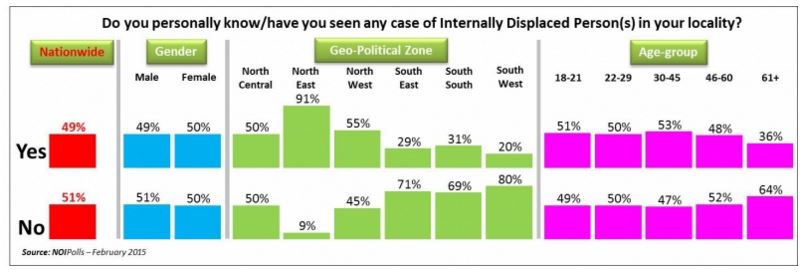The North East Development Commission (NEDCOM) bill, which will reach its third and final reading in Nigeria’s Senate House this month, focuses on rebuilding terror-stricken communities in the North East. The bill, supported by Senator Yakubu Dogara and 32 other lawmakers, seeks to restore 20 communities in Borno state, 6 destroyed communities in Adamawa state and 2 destroyed communities in Yobe state.
This appears to be a good move by the Senate as instability and insecurity in the region has led to the displacement of several indigenous people of the area. In a poll conducted by NOI Polls in 2015 on internally displaced persons (IDPs) in Nigeria, North Eastern Nigeria recorded a high number of IDPs as a result of terrorism.

Also, it is likely that Nigerians will welcome the introduction of this bill due to the fact that it can represent a way forward, tackling the after-effects of terrorism in the country. In a similar NOI Poll, several Nigerians expressed positivity towards a law that will protect internally displaced people in the country, and the respondents cut across geopolitical zones, age and gender.

Vanguard Nigeria reports that Senate leader, Senator Mohammed Ndume, told newsmen in Maiduguri, over the weekend, that by February this year, the rebuilding of all the destroyed communities will commence under various Implementation and Monitoring Committees (IMMC) in the affected areas. According to the report, Sen. Ndume said the bill, when passed into law, will mirror the existing Niger Delta Development Commission (NDDC) established in June, 2000 by the Olusegun Obasanjo administration to address the Niger Delta militancy issue in the South-South and South-East geopolitical zones.
This means that the commission will seek to reach the areas and people affected by the activities of Boko Haram terror which have been plaguing the country, particularly the North-East, since 2009. Although the NDDC was not inaugurated to tackle effects of terror activities, it did well in promoting the wellbeing of the Niger Deltans, who suffered as a result of the effects of environmental pollution from crude oil exploitation as well as the effects of militancy in the area which also afflicted the people in the region.
This is a positive step by the senate to ensure destroyed communities in the North East are rebuilt and developed, however, if NEDCOM will be similar to the NDDC, there has to be a shift in focus from power tussle within the commission to the citizens who are most affected by the brunt of destruction. This means that real or perceived power play and politics need to be avoided at all costs. Ever since its establishment 15 years ago, the NDDC has undergone several controversies based on corruption which has led to its inability to effectively change the lives of Niger Deltans for the better.
Last year, the Ijaw Youth Council (IYC) stated that the NDDC had become a conduit-pipe for diversion of funds meant for development purposes. They called on the federal government to decentralize the NDDC in order to allow the states in the commission have direct access to funds allocated to them. However, in July 2015, NDDC Chairman of the Board, Senator Bassey Ewa-Henshaw, while admitting that the NDDC lacked clarity of ideas, revealed that the federal government had not remitted N800billion worth of funds to the commission since 2001. This un-remittance of funds, he said, resulted in the NDDC’s incapacity to create business investment and employment opportunities for the people of the region.
For NEDCOM to be different from the NDDC, the government needs to take extra steps to ensure that those put in charge of the commission have a stake in the rebuilding projects of North Eastern Nigeria instead of elite members of society who have nothing to lose if the commission realizes its goals or not.








